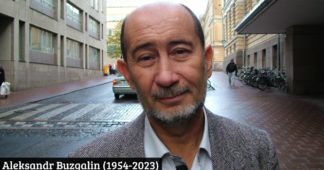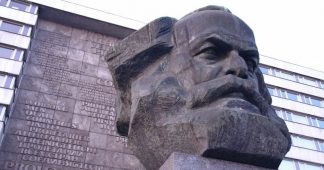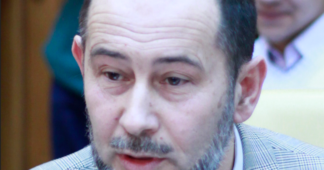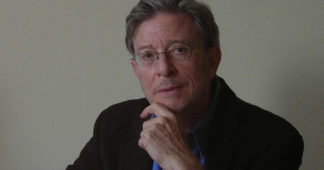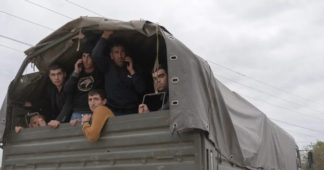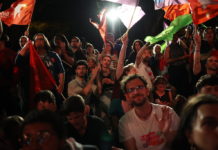By Dimitris Konstantakopoulos
Third of four articles on Alexandr Buzgalin and his era. The Soviet/Russian tragedy. You can read the first article here https://www.defenddemocracy.
What Russia (and also USSR and the “socialist bloc”) experienced in the late 1980s and early 1990s was a gigantic “democratic counter-revolution”. It was described as such in a very insightful way by Dimitrina Petrova, a minister in Bulgaria’s first post-communist government: “The only revolution that happened in Eastern Europe was the revolution of the nomenklatura, through which it freed itself from any moral responsibility.” The “communist bureaucrats” changed from being a managerial to being an owning class; with certain sections of it, serving, in particular, as a “bridge” towards the rapidly developing “world of crime”, in alliance with the West, its institutes and its secret services.
“Democracy” served as a slogan for the overthrow of the old regime, but democracy, as Aleksandr Buzgalin (https://www.defenddemocracy.press/alexandr-buzgalin-1954-2023/) used to point out, is a Greek word meaning the state, or the power of the demos, of the people, of the assembly of citizens. The purpose of those who led the counter-revolutionary process was certainly not to give any power and property to the people; it was to keep everything for themselves. The ill-conceived experiment of “democratization” of the USSR, based from the outset on false assumptions, with the specific forces that ultimately dominated it, could only come to its dramatic end when the House of Soviets was attacked in October 1993, with the encouragement and enthusiastic support of the West; opening the way to the plundering of the vast Soviet public property had been opened. In the USSR we did not go to any democracy in 1991. We went from the so-called ‘proletarian dictatorship’ to the so-called ‘democracy’ of the Mafia and the bureaucracy.
All this was accompanied by the violent rupture of the Soviet “social contract”, the disorganization of the state, the dissolution of the USSR, the violent destruction of social and inter-ethnic relations as they existed within the Union and a historically unprecedented economic, social, demographic and cultural destruction, since in a very short lapse of time Soviet Russia was carrying out – in the worst possible way – a fundamental transformation that Western capitalism took several centuries to accomplish: the detachment of the sphere of economy from the sphere of morality.
Naturally, such a change presupposed and at the same time created a deeply decadent spiritual ambience. This had already begun during the perestroika with the appearance of various miracle-working magicians of the Kashpirovsky Anatoly Kashpirovsky – Wikipedia type, with the uncontrolled demagoguery of Yeltsin and his friends; it included the deification of the West (which most Soviet deputies came to describe as the “civilized world”, thus calling their country and themselves uncivilized) and the explosion of crime. The most extreme of the liberal democrats, having spent their entire career in the Communist Party, were in a hurry to privatise everything and had no second thoughts when repudiating as criminal not only the Bolshevik Revolution but also all forms of utopia, while deifying Thatcher and Pinochet. Politburo member Aleksandr Yakovlev enthusiastically hailed the … opening of the world’s largest McDonald’s as a symbol of the new era – a few years later he would call for a ‘Nuremberg trial’ for the communists, without specifying whether he himself should be tried). Their opponents, on the other hand, unable to put forward an alternative plan for the country, preferred to simply embellish, beyond all seriousness, the country’s Stalinist and even Tsarist past
I am writing all this for one single reason: only by taking into account the climate of intellectual obscurantism, moral decadence, social disintegration as well as the complete domination of the neoliberalism prevailing in Russia and the other Soviet republics in the early 1990s, can we hope to understand why it was so difficult and so important for people like Aleksandr to maintain and develop as far as possible the tradition of rational, critical and Marxist thought and action. The impact of their ideas may have been limited, and it could not have been otherwise in such adverse circumstances, but they never ceased to exercise a far wider influence through their example, being an element of “homeostasis” in a social and intellectual organism that was in a chaotic twirl, reminding that some other spiritual model exists, that people do not have to choose between follies. The existence of even a small serious Marxist socialist current set a model and forced all other ideological currents not to stray beyond a certain limit. It was at the same time passing on to future generations a number of important, crucial ideas which the Russian people and any left movement worthy of the name will certainly need in their future battles. For several years now, an important trend has appeared in the Russian youth that is starting to look for Marxism and the ideas of the left; Buzgalin put his hopes on them, and taught them precious lessons.
At the same time he and his comrades remained a bridge to the Soviet past, to the struggles of Soviet workers and intellectuals, even under the power of the bureaucracy, to the elements of socialism that were certainly inherent in the Soviet bureaucratic regime. They did not go to the extremist rejection of the whole Soviet tradition; that was not their mentality. Aleksandr deeply understood the coexistence of very contradictory elements in the Soviet regime, the enormous enthusiasm it aroused, as well as its often hideous repressive aspects, and he has described both in various interviews. He was critical, not dismissive, of the “Soviet man”; he had a gut feeling for him – wasn’t he one, after all?
It so happened nonetheless that the weight of the repeated defeats experienced by the Russian people and the disintegration of their country eventually led to apathy and renewed the long traditions of acceptance of authoritarianism in Russian history. I remember in the mid-1990s or so, when I would say to him with indignation, “But no one reacts to these terrible things?”, and he would reply, holding back his bitterness, with calm acceptance of reality: “All the Russian citizen can do is to go and vote.” I was then far from imagining fate would put me, much later, in my own country, after successive popular/national defeats, in the same atmosphere of acceptance and passivity, which seemed unthinkable to me at the time. Peoples, like individuals, can easily pass from greatness to decadence and vice versa.
To judge someone like Aleksandr, it is not right to use only the criterion of direct and tangible effectiveness or wider acceptance. We cannot make an abstraction of the fact that he and his likes were acting “against the tide”, the huge Russian and global “counter-revolutionary wave” that began with the onslaught of Reagan and Thatcher’s neoliberalism, culminating in the dissolution of the Eastern bloc and the USSR itself. It has to be named ‘’counter-revolutionary’’ in the sense that it came to challenge the central demand of all revolutions of modern times, that man should become free and the subject of his own history. To say the very least, one cannot fail to see analogies between this period and the wave of reaction that prevailed in Europe for almost thirty years after the defeat of Napoleon,
Perhaps it is no coincidence that, 30 years after the peak of this “counter-revolution”, we now see Russia, China, the global South, challenging the global domination of globalized Capitalism and the “Hyper-imperialism” of our time. Confirming a prophecy of Lenin who did say, a hundred years ago, that the victory of socialism is inevitable because all these peoples far outnumber Westerners. We are not yet on the verge of a victory of socialism, but we already witness a significant weakening of world Capital and its geopolitical expression, the allied states of the “collective West”, compared to the unipolar moment of 1989-91.
The value of Aleksandr and of others like Aleksandr lies in the fact that they kept the candle burning in dire conditions, with all the winds of history raging to blow it out.
Fighting for a left alternative
Aleksandr Buzgalin was not only a theoretician. He was politically very active during the perestroika period, a period characterized by a very intense mobility of the working masses and intellectual workers. Aleksandr found himself at the head of a great movement that united the Soviet workers’ collectives favouring self-management. As he told me in an interview in 2021, ‘there has been a democratic communist opposition in the Soviet Union. This was the movement for self-management in workers’ collectives and enterprises. It was an original self-management movement of socialist tendencies.”
But this movement met with strong opposition from the bureaucracy, the business managers, not least from Gorbachev himself, who did not really mean for his democratic declarations to be actually implemented at the very grassroots of society. The miners would later go on giant strikes, which shook the regime, in Kuzbass, Donbass, Vorkuta and Karaganda (Kazakhstan), and Aleksandr would participate in the Kuzbass miners’ congress. He was working towards the formation of a “left-wing self-management alternative” to the liberal, pro-capitalist and pro-Western direction that Mikhail Gorbachev’s reform tended to embrace.
Unfortunately, workers, in their vast majority, were trapped in an environment of indescribable confusion. As Buzgalin described it in the same interview: ‘At the congress of the Kuzbass strike committees (in Siberia) most delegates said they wanted a “democratic market society”, where the workers would be the bosses of the factories and mines, where everyone would be paid good wages, where there would be strong unions, independent workers’ organisations, no nomenklatura, where the state would be run by the citizens, etc.” A series of illusions, that is.
I also remember an interview I did for the Greek newspaper “ta Nea” with Aslanidis, leader of the striking miners in Kuzbass, of Greek origin, who presented the West, about which he obviously knew nothing, as a model of a civilized way of life. Whenever I talked to Soviet workers at that time, I got the impression that they believed privatization meant they would take over the factories themselves, while retaining all the great advantages they had in Soviet enterprises, which amounted to an extra social wage. Soviet factory workers had free nurseries and schools, restaurants where they ate three meals a day and had more to take to their homes, health care centres (for primary medical care), sanatoriums and children’s holiday camps, cultural institutions, while in sparsely populated areas where new factories and businesses were being built, they were provided with houses as well as free transportation to and from the business. So they believed that they would keep all these along with other new advantages. Such was the level of consciousness of the coming reality and the delusions they had. I even remember that when I went to Karaganda, Kazakhstan, shortly after the dissolution of the USSR, I asked the leaders of the miners what the workers were saying about founding themselves in … another country. They told me that the workers didn’t care because this didn’t affect their relationship with their bosses. They were interested in the immediate social relations that concerned them, they did not consider that they had a say in the broader issues of the state, which they left to the bosses. It was to this level of politics and “class” consciousness that the Soviet working class was led by the supposedly first workers’ state in history. This political level, as well as the level of the entire Soviet society and especially the ruling class, allowed such a lost case as Boris Yeltsin to become President of Russia and dissolve the Soviet Union, through one of the biggest frauds in history (” If the standard of living falls I will fall on the tracks to be run over by a train”, this despicable person said, before unleashing the “shock therapy” of the Russian economy, recommended by the Americans, that is to say the “economic equivalent” of a medium-sized nuclear attack. And the poor Russians had to rush and buy food to store for the first three difficult months).
I should add that all the “actors” in these circumstances had an extremely limited awareness, when all this was happening, of the importance of Gorbachev’s concessions to Western imperialism and the way in which they prepared the overthrow of the Soviet regime and the dissolution of the USSR. They thought they were living on a continent independent of the world, as if the USSR was a planet in space.
Glasnost: shooting the ideological basis of the regime
The miners, as well as the middle classes (teachers, doctors, scientists, etc.) very soon paid dearly for the illusions of that period, seeing their standard of living crash as the first social state in history, which covered all the basic needs of the people “from birth to death” was being destroyed. By no means do I consider this outcome (the dissolution of the Soviet regime and the USSR) as inevitable, because it was not (even if strong “objective” factors were working in its direction) — and some very good American Sovietologists agree with this assessment. To a very large extent the outcome was decided by random factors, such as Andropov’s sudden death. I estimate, for example, that it would have been simply impossible, under Andropov’s leadership, for the USSR to take the direction it took under Gorbachev. If tiny Cuba did not collapse for “objective reasons”, would a, problematic so be it, superpower collapse if it somehow didn’t “want” to? No way!
It is the Soviet leadership itself that not only destabilized the situation in the country with its initiatives, but also attacked, perhaps without fully realizing it, the reason of being (raison d’être) of the Soviet state/regime and of the USSR.
Gorbachev’s economic policy disorganised the distribution of goods, while his unwillingness to impose state power with the necessary rigour on matters concerning pogroms against ethnic groups or the activities of the underworld had nothing to do with combating the ‘bureaucracy’; nor did it promote any ‘freedom’ and ‘democracy’, which cannot exist without responsibility – it simply dismantled any means of ruling the country, encouraging chaos and ungovernability.
But it is mainly the glasnost (transparency) campaign that completely destabilized the regime, not because it allowed the necessary free expression and debate, but because of the way it raised the issues and acted on the mass psychology of a population with no resistance to the aggressive, Western-style, TV campaign. An exact explanation of this process is out of place in the context of an article already in the verge of becoming too long, but, in the way the media (always under the control of the Party, remember) put the issue, they essentially presented the Soviet population, indirectly but explicitly, with a dilemma: do you want freedom like that enjoyed by citizens of Western countries, or not? Do you want the level of prosperity they have, or not? It was of course a fraud, the Soviet citizens buying a ticket to Stockholm while the plane was actually heading to Burkina Faso, but there was no one to explain the situation convincingly to them. The mass adoption by the regime itself of the Western propaganda directed against it could ultimately only lead to where it did.
The Soviet population was literally bombarded by a barrage of information about Stalin’s crimes, offered to the public, indirectly but explicitly, as evidence of the failure of socialism rather than of the betrayal of its ideas, plunging the citizens into feelings of guilt and the party and state officials into complete uncertainty and insecurity. Karotich, director of Pravda’s literary branch, Aganyok, once the author of slimy poems for Brezhnev’s birthday, was now launching a campaign to demonstrate the “terrible crime” of executing, in the midst of civil war, the Tsar and his family. Of course, any execution is an unpleasant event, though, as I heard historian Vladlen Loginov say one day, addressing a group of Red and White historians’ acolytes: “Don’t get too excited, there is no point in this quarrel. There is no humane way to put a bayonet in a man’s belly.” Any state founded on a revolution, in order to continue to exist, must respect it. The French, for example, no matter how far they have strayed from the ideals of their own revolution, still celebrate the capture of the Bastille and have the emblem of the revolution in their police stations; they do not weep over the execution of Louis and Marie Antoinette. As soon as it began to question the very Russian Revolution that created it and the socialism in the name of which it was founded, the Soviet state was losing its reason for being and the dissolution of the USSR was only a matter of time.
It would have taken a very competent political leadership to move away from where this situation was going on its own, especially as events tended to take on a cataclysmic character, following Naomi Klein’s “Shock Doctrine”, and leaving no room for people and politicians to realize what was happening. It should be noted that hardly anyone expected the USSR to break up (Aleksandr Buzgalin being one of the few who warned of this eventuality as early as in 1990). Everybody saw the country falling apart, but they didn’t believe in their hearts that it could actually do so; I think not even Washington, which was working very hard behind the scenes to achieve it, expected this to happen. That fact alone was a major cause of the final breakup. When what is about to happen is not foreseen and no one concentrates their efforts to preventing it, it is actually easier for it to happen. The river of history is more easily led into a bed where there is no human conscience and will to block it.
One would say perhaps, in retrospect, that the USSR probably needed a workers’ movement to defend it from its leadership, and it certainly did not have one.
The role of the West
In fact, if there was a strategic power, it was not in the USSR, it was in the USA. Washington started its efforts to overthrow the Soviet regime in October 1917 and never stopped, not even during World War II. There was perhaps no greater illusion in history than the expectation of the Soviet reformers that the West could become their ally in the effort to democratize and modernize the Soviet regime. Is there any mistake greater than taking an enemy for a friend (or vice versa)?
It was a former Ukrainian dissident, Sliapentoch, émigré in Michigan, who produced the theory of the confrontation of universal and class values that Gorbachev was later to promote. For socialism, class values were the way to realize universal human values. Marx saw in the working class a social force that could potentially liberate not only itself but the whole of society. The “new political thought” reversed this equation by showing “class values” as an obstacle to “universal values”. It thus laid the foundations of the domestic and foreign policy that led to the “suicide” of the Soviet regime.
Gorbachev also claimed that by doing so he was promoting world peace. We see this world peace in stark relief today as we find ourselves literally on the verge of a world war.
I suspect that even the scene with Yeltsin speaking from a tank during the “fake coup” of August 1991 was also the idea of American advertisers (I say fake coup because in real coups they arrest or kill the opposition leaders, they do not set up a stage for them to appear as the “Hercules of Democracy”). The idea was to identify in the collective Soviet unconscious the Russian President with Lenin when he spoke in the spring of 1917 at the Petrograd railway station, a scene that was very positively imprinted in the minds of all Soviet schoolchildren. Beginning with the characterization of Boris Yeltsin as a leftist and Yegor Ligachev as a rightwing politician, the deception was everywhere, but there were no brains to perceive it and stop it in time.
The study of history leaves no doubt about the role of the US agencies and Western institutions in the collapse of the USSR, including its final phase which began with the “fake coup” of August 1991, about which one only has to read the Washington Post article or the more recent revelations from the Clinton archives.
Conspiracy would exist anyway because it was, as we said, written into the politics of the West against soviet Russia since 1917 and because this politics was dictated by the very character of the Western capitalist and imperialist system. But conspiracies work like germs, succeeding only when the organism is already weakened.
After the fall
Lack of space forbids me from further explaining the many attempts made by Aleksandr Buzgalin to create a left party after the banning of the CPSU (of which he was elected a member of the Central Committee at its last Congress, representing the “Marxist Platform”) and the dissolution of the USSR, as well as the reasons for their failure. In the interview he gave me in August 2021, he describes the situation in the early 1990s as follows: ‘The economic crisis in the early 1990s was so deep that the only social stratum on which a left opposition could rely, the ordinary intellectuals (intellectual workers), the engineers, teachers, doctors, public sector workers, skilled workers of large enterprises, were becoming terribly poor. They had to work 14 hours a day without a break to survive and this made self-organisation impossible.”
The CIA feared an explosion of social struggles in 1991 because of the shock treatment. It didn’t happen firstly because many factories were closed and the working class that could have risen up had disappeared, the workers traveling to Turkey making a living by bringing and reselling goods or did various menial jobs. Secondly, there was no plan to rally them. It was only in 1992-93 that a strong mass opposition from neo-Stalinist currents began to emerge, capable of bringing down 300,000 demonstrators in Moscow with something like a whiff of “Soviet nostalgia”. In the process, the Russian parliament (Congress of People’s Representatives) will come into conflict with Yeltsin and his neoliberal, and incoherent on top of that, policies, but it lacked a leadership competent of leading a victorious conflict with Yeltsin and his US advisors. With American encouragement (probably starting with National Security Adviser Scowcroft and then the Clinton administration) Yeltsin will realize a a coup d’état dissolving and bombing the Russian parliament, killing 1500 people, to the cheers and celebrations of the Western governments. This ended the experiment in democratisation of the USSR launched by Gorbachev in the second half of the 1980s and paved the way for the greatest looting of all time, the looting of the enormous Soviet public property.
Buzgalin acted decisively, with his very small forces, against Yeltsin and the dictatorship the Russian President subsequently imposed. We worked together at that time, trying to disseminate a text of support to the deputies signed by a number of personalities of the European left, led by Michel Pablo (Michel Pablo – Wikipedia, who, in his appeal, particularly stressed the responsibility of the Russian armed forces to defend the elected representatives of the Russian people and to prevent Yeltsin’s dictatorship. (For the record, several Western European leftists were disturbed by this reference to the military. They wanted the “class struggle” to be done only with flowers, and to limit itself only to the means they preferred; they did not want to get their hands dirty).
We remind our readers that publication of articles on our site does not mean that we agree with what is written. Our policy is to publish anything which we consider of interest, so as to assist our readers in forming their opinions. Sometimes we even publish articles with which we totally disagree, since we believe it is important for our readers to be informed on as wide a spectrum of views as possible.
